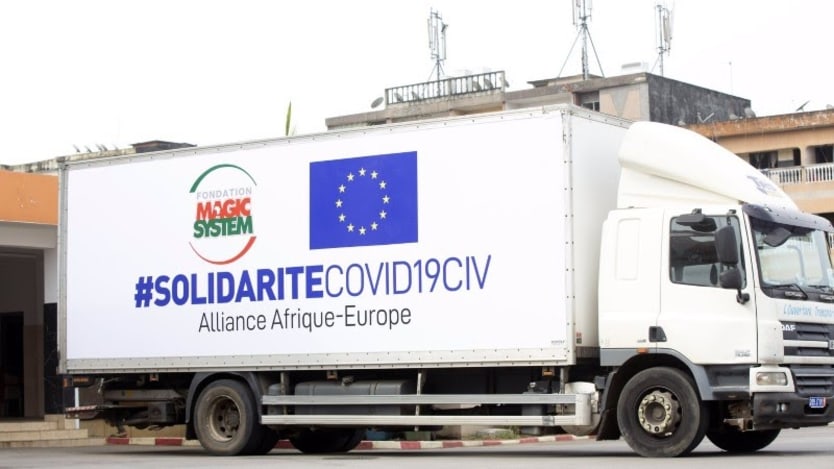
BRUSSELS — As the European Commission unveils its response to the coronavirus around the world this week, expect a lot of talk about “Team Europe.”
“The European Union is securing more than €15 billion [$16.3 million] to help our partners worldwide to fight coronavirus. And more money will come from our national governments, in a true Team-Europe spirit,” commission President Ursula von der Leyen announced Tuesday. “This could help cover immediate needs in the health sector, and it should also support the economy in these countries to keep people in jobs.”
This article is part of the Battle for Africa series:
► EU offers blueprint for relations with Africa
► 5 questions about the EU's new blueprint for Africa (Pro)
► As Europe uses aid to push private investment in Africa, NGOs push back
The release of the commission’s global COVID-19 policy Tuesday and upcoming meeting of European Union development ministers Wednesday come after an internal note from Koen Doens, the director-general of the commission’s development arm, DEVCO, that emphasized the need for “a strong and coordinated European response in a geopolitical context.”
“COVID-19 risks being politicised to the advantage of international actors with a different agenda to ours,” the note read. “This is the case of China, which has moved on from being the cause and the epicentre of the crisis to being perceived as a strong supporter of efforts by affected third countries to contain the crisis.
“This narrative is being accompanied by a growing trend of an anti-European narrative now that the pandemic is hitting EU member states more strongly. To counter this twin narrative and avoid the negative consequences for the image of the EU, we need to muster a strong and effective external response...”
In an email accompanying the note, Doens wrote: “The EU and its member states together need to show that we are bigger than the sum of our parts and that we act as ‘Team Europe’. This will serve a double purpose: one, to help counter anti-European narratives that are emerging and which damage our reputation; and second, to show the actual size of Europe’s contribution to the global response that we can put together, which, if we conduct this exercise thoroughly across all our programmes, can be huge, showing the solidarity of the EU vis-à-vis partner countries.”
EU concern over competition in Africa with China, India, Russia, and the Gulf states is not new. However, Susi Dennison, director of the European Power program at the European Council on Foreign Relations, told Devex that the EU’s response to the coronavirus in Africa is becoming a test of whether the commission’s recent work on a new strategy with the continent is all talk or not.
At the same time, Dennison said EU officials are angry at Beijing asking Brussels to keep EU assistance to China quiet when the virus was peaking there, only to promote its own support to states like Italy weeks later, which gave fuel to anti-EU populists.
As a result, for the EU, “the justification for sending aid abroad is even harder than it would anyway have been,” Dennison said. “I think all of that is contributing to this competitive tone that you are seeing.”
In March, Josep Borrell, the European Union’s foreign affairs chief, wrote of the “geo-political component” to the crisis, “including a struggle for influence through spinning and the ‘politics of generosity.’” In a separate opinion piece, he added that “the EU must remain a unifying factor, by promoting joint efforts with China and the United States to address the pandemic and its consequences. Only with these three powers pulling in the same direction can the G20 and the United Nations make a real difference.”
In Côte d'Ivoire, a truck delivering supplies from the EU is already promoting “#Solidarite” and the “Africa-Europe Alliance.” An EU spokesperson said the truck will provide food and preventive material to 5,000 people confined in one of the biggest communes of Abidjan.
“The EU has contributed to it with €250,000 and as per standard practice, its emblem is reproduced where appropriate together with the logos of other donors,” the spokesperson said.
Asked by Devex whether the EU risked engaging in exactly the kind of “geopolitical turf battles” that world leaders are now warning against, the spokesperson responded: “We believe that what makes the difference between factual reporting and engaging in geopolitical turf battles, as you call it, is the right balance and proportion of communication efforts.”
The Chinese embassy in Brussels did not respond to a request for comment.
We’ve removed our paywall for this article — previously for Pro subscribers only — to provide access to accurate information and resources during the COVID-19 outbreak.




